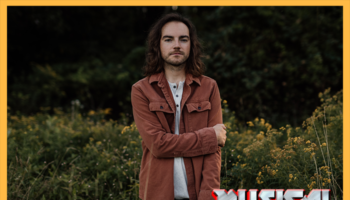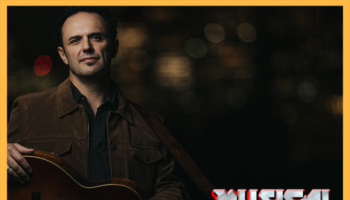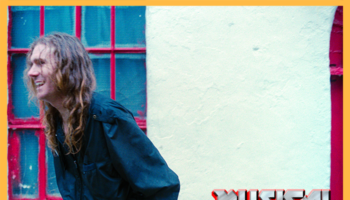Musical Mondaze
Dave Hause
 You don’t have to be in a funk just because it’s (feeling) like a Monday. Instead, get funky!
You don’t have to be in a funk just because it’s (feeling) like a Monday. Instead, get funky!
TrunkSpace brings you another (bonus) edition of Musical Mondaze. This time out we’re sitting down with Dave Hause, a living legend of the punk rock scene and frontman of the Philadelphia-based The Loved Ones. His new solo album “Bury Me In Philly” drops tomorrow and highlights his incredible songwriting abilities, a process that was helped along by his love for his working class home and the creative input of his brother.
TrunkSpace: We know you’re a few days away from the release of your new album “Bury Me In Philly.” Do you get butterflies right before new music hits?
Hause: It is. There’s definitely that anxious anticipation. The good thing was, when the stream went up yesterday… we have full band rehearsals all week leading up to the first shows, so we were able to really dive in. I was really focused all day and not able to read the initial comments or the initial feedback… positive or negative. We were entrenched in sort of living in the music and figuring out how we were going to perform it and stuff, so that was a really welcome distraction. But, yeah, it’s really exciting but scary. You’re kind of showing your flank, so to speak. And, the internet can be a strange place. The world can be a strange place. And when you’re showing sort of the vulnerable side of yourself, it can be scary. Thankfully, I’ve been down this road before and there’s a little bit of muscle memory to the whole process that I can lean on more than I could have in past release times.
TrunkSpace: You mentioned the welcome distraction keeping you from following the reaction to the stream, and what’s interesting is that everything is so instantaneous nowadays. It used to be that the instant reaction came from a live audience, but now there’s a live audience everywhere.
Hause: Yeah. You’re right about that. The other thing that I found peculiar was… by and large music is simply streamed or consumed online… when the record gets streamed, it’s out. For all intents and purposes, it came out yesterday. You know, I get that on Friday that’s when it will download onto people’s phones or their pre-order vinyl will show up and all that stuff, and that certainly is a much more personal sort of tangible thing directly with the fans, but ultimately once it’s streaming and you can play each song… the record is essentially out. So, it does sort of feel like we just let the cat out of the bag, but I guess things are marketed… you know, they’re marketed however they’re marketed now. Once you are done with mastering, the record starts to be out of your hands. (Laughter) It’s a weird thing.
TrunkSpace: It sort of feels like marketing these days is kind of fluid because, it’s changing just as quickly as new practices are established.
Hause: Yeah. It’s interesting. I follow Bob Lester and even he seems to be chasing answers and asking lots of questions about making music and what this time is all about and all of that. It seems like every couple weeks he’s got a newsletter where he’s like, “Throw out the rule book!” (Laughter) Which is fine, you know… I think, again, I’m more interested in the process, especially the older I get. I’m more interested in the creative process and the recording process and I’m a veteran of the road so all of that stuff kind of comes naturally. The marketing of it and the way to get the music to people, thankfully, is not as much… not my job, I guess. But that said, I have taken a much more committed approach to this record in terms of… because I have a direct line on Facebook and Twitter and Instagram and all that stuff, I’ve been trying to respond to every fan and every person that comments or says something about the record. Not necessarily as a marketing tool. I’m sure that helps to a degree, but more because the lines of communication are open and, you know, it makes for a community vibe and I think wasn’t available when I started making records. And it occurred to me that having that direct line is really cool. The whole point of this thing is to communicate, so I’ve been trying to take that seriously and sort of add that to part of my job right now… to thank people for giving the record a shot. I don’t really assume that I’m owed anything or entitled to their ears. If they want to spend the time listening and supporting it and stuff, I’m going to do my best to thank them personally, even if it’s four lines on the internet.
TrunkSpace: So when you personally look at the new album as a whole, at least from a songwriting standpoint, is there a theme that connects all of the songs for you?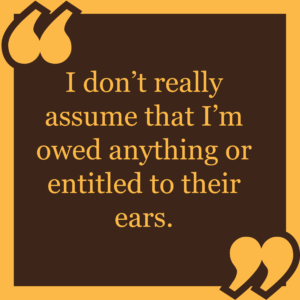
Hause: It’s sort of coming to grips with that fact that I’ve always been looking forward… always been looking past the constraints of where I’m from. I think that now that I’ve ended up in California and I’ve found someone that I love, I wanted to sort of honor where I’m from and like, sort of put a flag in what made me who I am and what shaped the way I think.
TrunkSpace: Is that a sort of creative homesick?
Hause: Yeah. It’s tough when you move this far away from everything you know. And everyone you know. As great as this town is and as great moving here has been, there was a homesickness. There was an element of displacement that I couldn’t quite wrap my head around. California culture is as different as Philadelphia as going to Europe… moving to England or something. So, sort of wrapping my head around that and trying to deal with that ambivalence sort of also gave me a real appreciation of where I’m from. I realized how much of an underdog mentality and how much of a Philadelphia working class spirit I have. It’s never going to get out of your system. It’s like being taught about Jesus when you’re little. You may not believe it when you’re older, but it’s definitely a specter over most of the things that you do.
TrunkSpace: It was ingrained in you.
Hause: Right. And so I was trying to really figure that out and write about that. I served a few different masters. I wanted to make a much more uplifting album than the last one. I wanted to write shorter songs and have them be more, you know, power pop oriented. I wanted it to be really concise. So, in order to get to say all the things that you want to say, and be concise, it gets pretty difficult, so I think that was part of the reason it took awhile… to figure out what was fat and what was bone and real meat and boil it down to its simplest and most direct elements.
TrunkSpace: So was that mindset also applied to the production itself because in listening to the album it feels like, the record as a whole is a pool table and each song is a pocket in that table, and without any of them, you don’t have a complete table?
Hause: Well thanks! One of the interesting push and pulls that we experienced in making the record… it was Eric Bazilian and William Wittman co-producing… and I think Eric astutely wanted Bill involved because he’s so talented and has so many ideas that he can get to tape so quickly. So Eric is the kind of guy that when I’m like, “Hey, this is a Stones-y kind of vibe,” he goes, “Oh, well do you want the Ronnie Wood guitar or do you want the Keith Richards guitar?” And it’s like, “Oh… both?” Can we put it all in there? (Laughter) And he’s like, “Well we can put a little Harrison thing here.” His frame of reference is so vast… he’s been making records that have done magic things for a long, long time. And William is Cyndi Lauper’s band leader and bass player and so, I think his role became a lot more like, “Alright, that’s cool, we could put an accordion, a melodica, a harmonium, and four twelve-string guitars on this, but what do we NEED to put on it?” So he would do a lot of the, What Would Tom Petty Do? sort of approach, and it would distil down the various… you know, the litany of ideas, it would distil them down to the ones that counted the most. Eric could take six passes at a lead guitar part and every one of them is better than the last, so it just became about making decisions and thankfully William has worked with him so long that he’s able to really quickly say, “That’s the best one… keep going!” And yeah, it certainly was an amazing, mind blowing recording process. My brother helped me write a bunch of the lyrics on the record, so his first recording experience was with these two masters of the craft who have Grammys and million-selling records. (Laughter) It was crazy. His mind was certainly blown… as was mine.
TrunkSpace: With Eric being a childhood idol… in terms of taking advice in the studio, particularly when it comes to creative, is it easier to be collaborative when the advice is coming from someone you’ve admired for so long?
Hause: It was. It certainly relaxed the pit bull in me about my own work. (Laughter) There’s been other sessions that I’ve worked in and other situations where I’ve worked in where I’m like, “No, no, no no! I know. I know.” And I always fight that anyway. I think you’re better off collaborating and listening to other people, but it became particularly easy to do that knowing the pedigree of these guys. And certainly having that childhood fascination with Eric and his work… you know, one of the days we finished up drums and Dave Hidalgo Jr. is a big baseball fan and we all went to see the Phillies play because Eric and Rob (Hyman) were playing “Take Me Out to the Ball Game” because they’re the Hooters guys. To me, I was like, “Oh my God!” If you were to tell seven-year-old me that I was going to be going to the Phillies game and hanging out in the dugout area with Rob and Eric from the Hooters, I would have never believed you.
TrunkSpace: Seven-year-old you was sitting a few rows back, eating popcorn captivated, watching adult you.
Hause: (Laughter) It was pretty crazy. I mean, I’ve had my share of brushes with idols… I’ve met Springsteen and I’ve met Joe Strummer and all that stuff… but there was a certain thing I think just because of the imprint that those guys made on me at such a young kid. I mean, it was bizarrely young to be fanatical about a band. I was only seven. So, it was a trip. There were definitely points where Eric was like, “Man, that fucking vocal take was awesome!” And I was like, “That’s the guy from the Hooters.” (Laughter)
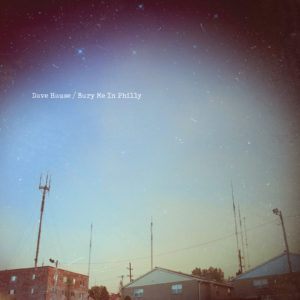 TrunkSpace: You mentioned that your brother co-wrote some of the lyrics with you. Can you walk us through what your songwriting process is. Does it start with the music? Does it start with the lyrics? What are their origins?
TrunkSpace: You mentioned that your brother co-wrote some of the lyrics with you. Can you walk us through what your songwriting process is. Does it start with the music? Does it start with the lyrics? What are their origins?
Hause: The more I study songwriting the more I find that my method isn’t that off the wall. I stock pile tons and tons of melodies and then typically I’ll take the melodies and write out the chords and make an arrangement. There will be little lines in there that pop up. You’re like, “Okay, well that’s clearly a lyric there” like in the chorus or in the bridge or something. And then a side exercise is that I’m always collecting quotes or coming up with lyric lines that are free and clear of the melodic parameters. So then, once things start to really pile up, which they really did… I wrote about 40 songs over the course of “Devour” being complete and recording this, so I have a ton of unused material. I start to put it all together and see what fits and what lyrics feel right in which songs. I really started to get pretty deep into the forest and my brother was super pivotal in pulling the threads that became the record. Lyrically, I kind of just dumped all of my ideas, which is like, you know, dozens and dozens of pages of little snippets and he found ones that he liked and we started to put it all together… just like I usually do, but to have another set of eyes on it was really helpful.
TrunkSpace: It sounds like it was kind of like having a lyrical producer.
Hause: Right! And then he started to add lyrics, you know, add lines of his own where I was like, “Oh my God!” There are lyrics on the record that I’m jealous that I didn’t write that he wrote. There’s a line in “Divine Lorraine” that says: “The middle of the road takes a toll.” And I was like, “Goddamn it! You little weasel!” (Laughter) I’m not sure I ever would have gotten to that! I mean, it was sitting right there all these years… living in the middle of the road takes its toll. It’s just such a good metaphor. So, there were moments like that once we really dug into the process where, he was pivotal. Even the concept of writing about the Divine Lorraine and just seeing this old hotel that’s always being threatened to go away and really it’s like a symbol of a working class, old Philly. To even write about that was such a great idea and that was one of his contributions.
TrunkSpace: You mentioned having written 40 songs. What is the status of those that didn’t make it on “Bury Me In Philly?”
Hause: I have almost a full record in addition to this one, just about finished recording. So, yeah, I don’t know what to do next. (Laughter) It’s going to be interesting.


